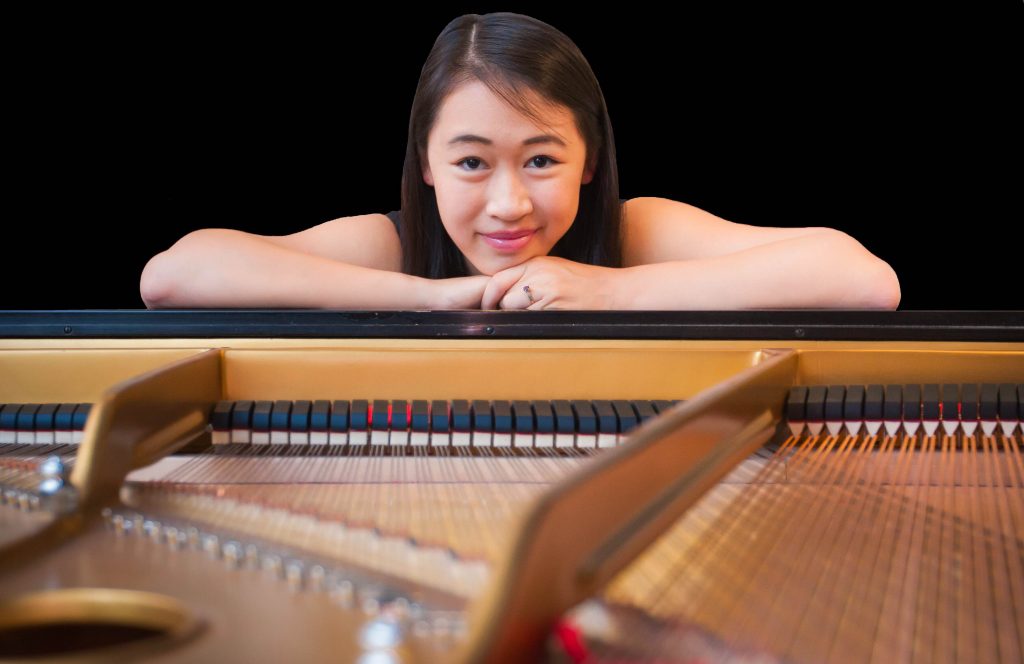Q&A with Madeline Wong, piano
This past summer the Bowdoin International Music Festival welcomed 255 student participants from 27 countries and 30 states, including 17 remarkable Festival Fellows. Sixty-five percent of these participants received scholarship funds from the Festival. In celebration of an incredible 2016 season and in anticipation of an even better 2017 season, we’ve reached out to last year’s participants to reflect on their experience at the Festival and their lives as musicians.

Madeline Wong, piano
BIMF: What are some of your earliest musical memories?
Madeline: I remember when I was four or five years old, my dad helped me practice piano every day. We would play duets that have a simple melody for young kids to play and a more complicated two-handed part for the teacher. I remember being absolutely in awe of what he could do and thinking that I’d never be as good.
When I was young, I loved, and still love, to sing. I would walk around the house playing with my dolls or stuffed animals, singing nursery songs or church songs constantly. My parents joked that I held concerts in the bathroom. When my mom took me shopping, I would cheerfully sing in the cart or stroller, totally oblivious to other shoppers. Even after my parents tucked me in at night, I would sing in the dark. Years later, I realized that my brother could hear me from his bedroom every night. To his credit, he never told me to stop.
BIMF: At what age did you start playing your instrument?
Madeline: I started playing piano when I was four years old. My parents gave me a choice: learn Chinese or learn piano. I chose piano.
I began to really enjoy piano somewhere between middle school and high school. My preteen dramas and heartbreaks may have been frivolous in hindsight, but they helped me to put meaning into the pieces I was learning. I started to take an active part in choosing which pieces to learn. Liking a piece really motivated me to practice and to learn it well. I distinctly remember learning the first movement of Mendelssohn’s Fantasy in F-sharp Minor in just a week. I’m sure my teacher wished I would be as motivated when approaching Bach.
BIMF: What is the longest you’ve ever spent preparing a piece of music?
Madeline: I’ve been working on Beethoven’s Sonata No. 30, Op. 109 for over two years.
BIMF: If you could play with any musician who would it be?
Madeline: It would be hilarious to play with Aleksey Igudesman and Hyung-ki Joo. They’re actually comedians as well as musicians, so it’s not an obvious pick, but I like that they take the edge off of a sometimes overly serious culture.
BIMF: How do you make a well-known piece of music your own?
Madeline: I start attaching personal meaning to a piece after I’ve learned the notes. At that point, my teacher and I start focusing on the phrasing, taking ideas from different artists’ recordings and combining them into a whole new interpretation. The process of daily practice, through all the ups and downs of life, also solidifies a piece as my own. I’ll recall memories of happiness, serenity, or turbulence as I practice, and use those memories to form emotional and personal connections to the music.
BIMF: How would you explain your passion for chamber music to a non-musician?
Madeline: There’s just something about all these different parts and people coming together and collaborating to make one piece of music. You might fight a lot of the time or complain about each other, but there will also be those amazing moments when everything works out and all the parts are in sync. Those moments are just pure music.
BIMF: What was one highlight of the 2016 Festival for you?
Madeline: The opportunity to be in Yong Hi Moon’s studio. I was only there for two weeks because of a scheduling conflict but I learned so much in that small span of time.
The myriad of concerts was also a highlight. It isn’t often that I’m completely surrounded by music, and I rarely have the opportunity or time to attend professional concerts outside of the Festival. And, of course, I can’t speak of the Festival without mentioning the peers I met there. All of the musicians were extremely talented, obviously, but they were also extremely friendly, quirky, and funny. I’m grateful that the Festival provided me with the opportunity to meet so many unique and talented musicians from all over the world.
BIMF: What advice would you offer to an aspiring musician?
Madeline: Be open to all types of music. I know classical musicians who dismiss any song written after the 20th century, and I know enthusiasts who’ve memorized every Disney soundtrack by heart but don’t realize that the melody of Sleeping Beauty’s “Once Upon a Dream” comes from Tchaikovsky’s original ballet score. There’s a lot to be learned from listening to and performing all types of music.
Most importantly, if you don’t love it, don’t do it. Remind yourself on the bad days why you chose music over things like wealth, stability, or relaxation. It’s easy to forget about beauty when you’re hyper-focused on that one note you keep missing or that one phrase you just can’t seem to nail. There’s more to music than perfecting your own 32nd notes or envying your peer’s insanely difficult repertoire. Training as a musician takes so many hours and so much commitment. For most people, it doesn’t result in fame or fortune in the end. That’s alright, though, as long as you’re doing what you love.
